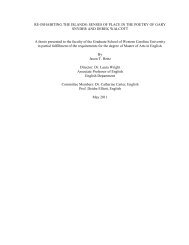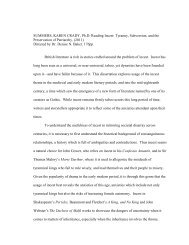Song Character Analysis Worksheet - The University of North ...
Song Character Analysis Worksheet - The University of North ...
Song Character Analysis Worksheet - The University of North ...
You also want an ePaper? Increase the reach of your titles
YUMPU automatically turns print PDFs into web optimized ePapers that Google loves.
gender) inequality forced them instead to work at low-wage jobs to support their<br />
families. 45 As young white women are portrayed as innocent and chaste, ethnic women<br />
are presented as sexually aware and seductive. In literature, they are portrayed as sexual<br />
beings, able to lure men just by their presence. 46 In Show Boat, this stereotype is por-<br />
trayed as a caricature in the role <strong>of</strong> Queenie and a subplot shorthand for the role <strong>of</strong> Julie<br />
Dozier. <strong>The</strong> aid societies and civic groups <strong>of</strong> the Southern Belle excluded African-<br />
American women in the “Jim Crow “ segregated politics <strong>of</strong> the South, but the New<br />
England Victorians embraced the plight <strong>of</strong> the Ethnic woman as part <strong>of</strong> their reforms for<br />
welfare and settlement housing.<br />
As a summary <strong>of</strong> these nineteenth-century gender stereotypes, Jessie Bernard’s<br />
text from Women in the Public Interest seems appropriate. She wrote, “American<br />
woman’s role is similar to that <strong>of</strong> an underdeveloped nation—her natural resources are<br />
funneled to her husband in return for economic support and protection . . . but she has no<br />
equal voice in decisions and is probably viewed as inferior.” 47 Or, as the original<br />
suffragette Elizabeth Cady Stanton wrote in her memoirs regarding the commonality <strong>of</strong><br />
women, regardless <strong>of</strong> class or ethnicity, women are “ranked with idiots, lunatics and<br />
criminals in the Constitution.” 48<br />
Beginning in the 1890s, however, social paradigms began to shift in favor <strong>of</strong><br />
greater independence, higher education, and greater economic opportunities outside the<br />
45 Pleck, 1952.<br />
46 Kerber and DeHart, 485. Sam Dennison provides a provocative study on sexual stereotypes <strong>of</strong><br />
black men and women in “Coon songs” <strong>of</strong> the 1880s and 1890s in his book, Scandalize My Name: Black<br />
Imagery in American Popular Music (New York: Garland Publishing, 1982).<br />
47 Quoted in Richmond-Abbott, 73.<br />
48 Eighty Years or More: Reminiscences, 1898. Quoted in Donnelly, 138.<br />
50

















